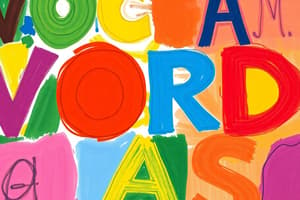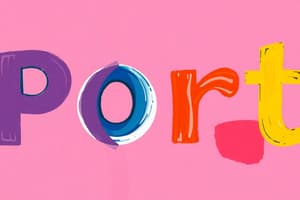Podcast
Questions and Answers
In word formation, a prefix is attached to the end of a word to change its meaning.
In word formation, a prefix is attached to the end of a word to change its meaning.
False (B)
A synonym is a word with an opposite meaning.
A synonym is a word with an opposite meaning.
False (B)
A verb is a type of pronoun that replaces a noun in a sentence.
A verb is a type of pronoun that replaces a noun in a sentence.
False (B)
A compound sentence is a sentence with only one independent clause.
A compound sentence is a sentence with only one independent clause.
Imagery is a type of poetic device that compares two unlike things using 'like' or 'as'.
Imagery is a type of poetic device that compares two unlike things using 'like' or 'as'.
A haiku is a type of poem that always has a specific rhyme scheme.
A haiku is a type of poem that always has a specific rhyme scheme.
Flashcards are hidden until you start studying
Study Notes
Vocabulary
- Word formation:
- Prefixes: attach to beginning of words to change meaning (e.g., un-, re-, de-)
- Suffixes: attach to end of words to change meaning (e.g., -ful, -less, -ly)
- Compounding: combining two words to create a new word (e.g., bookshelf, toothbrush)
- Synonyms and Antonyms:
- Synonyms: words with similar meanings (e.g., happy: joyful, cheerful, delighted)
- Antonyms: words with opposite meanings (e.g., hot: cold, big: small)
- Homophones and Homographs:
- Homophones: words pronounced the same but with different meanings (e.g., to/too/two)
- Homographs: words spelled the same but with different meanings (e.g., bank: financial institution vs. riverbank)
Grammar
- Parts of Speech:
- Nouns: person, place, thing, idea (e.g., dog, city, happiness)
- Verbs: action or state of being (e.g., run, be, have)
- Adjectives: modify nouns or pronouns (e.g., big, happy, blue)
- Adverbs: modify verbs, adjectives, or other adverbs (e.g., quickly, very, well)
- Pronouns: replace nouns in a sentence (e.g., he, she, it, they)
- Prepositions: show relationship between words (e.g., in, on, at, with)
- Conjunctions: connect words, phrases, or clauses (e.g., and, but, or)
- Interjections: express emotion (e.g., oh, wow, ouch)
- Sentence Structure:
- Simple sentences: one independent clause (e.g., I like coffee.)
- Compound sentences: two or more independent clauses joined by a conjunction (e.g., I like coffee, and I drink it every morning.)
- Complex sentences: one independent clause and one or more dependent clauses (e.g., When I wake up, I drink coffee.)
- Compound-complex sentences: multiple independent clauses and one or more dependent clauses (e.g., I like coffee, and when I wake up, I drink it.)
Poetry
- Poetic Devices:
- Imagery: language that appeals to the senses (e.g., "The golden sun sets slowly in the sky.")
- Metaphor: comparison between two unlike things (e.g., "He is a lion on the battlefield.")
- Simile: comparison between two unlike things using "like" or "as" (e.g., "He runs like a cheetah.")
- Alliteration: repetition of initial consonant sounds (e.g., "She sells seashells by the seashore.")
- Poetic Forms:
- Sonnet: 14-line poem, usually in iambic pentameter, with a specific rhyme scheme
- Haiku: three-line poem with a syllable count of 5-7-5, traditionally featuring nature imagery
- Free Verse: poem without a regular rhyme or meter, often with a more conversational tone
Vocabulary
- Word formation involves adding prefixes, suffixes, and compounding to change word meanings
- Prefixes attach to the beginning of words to change their meaning, e.g., un-, re-, de-
- Suffixes attach to the end of words to change their meaning, e.g., -ful, -less, -ly
- Compounding involves combining two words to create a new word, e.g., bookshelf, toothbrush
- Synonyms are words with similar meanings, e.g., happy: joyful, cheerful, delighted
- Antonyms are words with opposite meanings, e.g., hot: cold, big: small
- Homophones are words pronounced the same but with different meanings, e.g., to/too/two
- Homographs are words spelled the same but with different meanings, e.g., bank: financial institution vs. riverbank
Grammar
- Nouns are words that refer to a person, place, thing, or idea, e.g., dog, city, happiness
- Verbs are words that express action or a state of being, e.g., run, be, have
- Adjectives are words that modify nouns or pronouns, e.g., big, happy, blue
- Adverbs are words that modify verbs, adjectives, or other adverbs, e.g., quickly, very, well
- Pronouns are words that replace nouns in a sentence, e.g., he, she, it, they
- Prepositions are words that show the relationship between words, e.g., in, on, at, with
- Conjunctions are words that connect words, phrases, or clauses, e.g., and, but, or
- Interjections are words that express emotion, e.g., oh, wow, ouch
- Sentence structure can be simple, compound, complex, or compound-complex
- Simple sentences have one independent clause, e.g., I like coffee.
- Compound sentences have two or more independent clauses joined by a conjunction, e.g., I like coffee, and I drink it every morning.
- Complex sentences have one independent clause and one or more dependent clauses, e.g., When I wake up, I drink coffee.
- Compound-complex sentences have multiple independent clauses and one or more dependent clauses, e.g., I like coffee, and when I wake up, I drink it.
Poetry
- Poetic devices are used to create vivid imagery and convey meaning
- Imagery is language that appeals to the senses, e.g., "The golden sun sets slowly in the sky."
- Metaphor is a comparison between two unlike things, e.g., "He is a lion on the battlefield."
- Simile is a comparison between two unlike things using "like" or "as," e.g., "He runs like a cheetah."
- Alliteration is the repetition of initial consonant sounds, e.g., "She sells seashells by the seashore."
- Poetic forms can include sonnets, haikus, and free verse
- Sonnets are 14-line poems, usually in iambic pentameter, with a specific rhyme scheme
- Haikus are three-line poems with a syllable count of 5-7-5, traditionally featuring nature imagery
- Free verse is a poem without a regular rhyme or meter, often with a more conversational tone
Studying That Suits You
Use AI to generate personalized quizzes and flashcards to suit your learning preferences.




